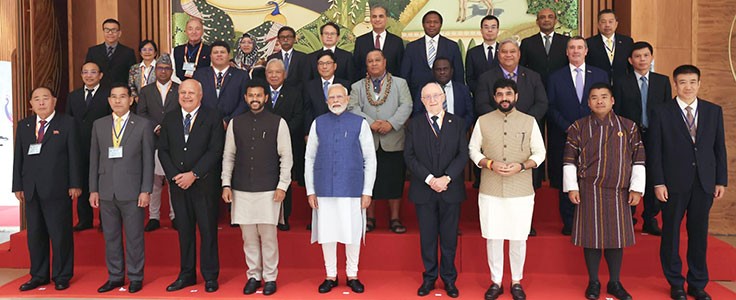29 Asia Pacific nations agree to reduce the impact aviation has on the environment
Posted: 20 September 2024 | Gabriel Higgins | No comments yet
In New Delhi, a landmark conference has resulted in 29 Asia Pacific nations to commit to The Delhi Declaration, which sets to make future aviation sustainable and reduce its negative impact on the environment.


Credit: International Civil Aviation Organisation
A landmark ministerial conference in New Delhi, India, has resulted in 29 Asia Pacific nations to commit to sustainable aviation. The high-level Ministerial conference named, The Delhi Declaration, has set ambitious targets for the future in an area that is seeing fast growth in the aviation sector. “This declaration is a roadmap for the future of aviation in one of the world’s fastest-growing regions,” said ICAO Council President Salvatore Sciacchitano. “It demonstrates a collective will to embrace innovation while prioritising safety, security, and environmental responsibility.”
The International Civil Aviation Organisation (ICAO), co-hosted the event with the Government of India. Over 200 delegates were gathered to discuss commitments and reflect on the aviation industry while addressing sustainability. Those in attendance included 12 ministers, eight Deputy/Vice Ministers and 24 directors general of civil aviation. The Prime Minister of India, Narendra Modi, also attended the conference, with his presence demonstrating that aviation is a critical component of the nation’s economic development.
What was the focus of the Delhi Declaration?
A key focus of the Delhi Declaration is accelerating efforts to reduce aviation’s environmental impact. This commitment was symbolically underscored by India’s initiative to plant 80,000 trees commemorating ICAO’s 80th anniversary. The declaration also emphasises the critical role of accelerating progress towards gender equality in the sector. India leads with 15% of its pilots being women, triple the global average. However, further efforts are needed to ensure gender equity in aviation across the region and to meet the human resource demands of the sector’s rapid expansion.
Join our free webinar: Revolutionising India’s travel experience through the Digi Yatra biometric programme.
Air travel is booming, and airports worldwide need to move passengers faster and more efficiently. Join the Digi Yatra Foundation and IDEMIA to discover how this groundbreaking initiative has already enabled over 60 million seamless domestic journeys using biometric identity management.
Date: 16 Dec | Time: 09:00 GMT
rEGISTER NOW TO SECURE YOUR SPOT
Can’t attend live? No worries – register to receive the recording post-event.
The Declaration outlines several key commitments, including:
• Supporting the implementation of ICAO’s global plans for safety, air navigation, and aviation security
• Accelerating the adoption of new technologies to enhance safety and efficiency
• Investing in infrastructure to support sustainable growth and emerging aviation concepts
• Promoting gender equality across all levels of the aviation sector
• Reducing emissions and other environmental impacts of aviation
• Enhancing regional cooperation in air traffic management, search & rescue and aviation security.
The Declaration reaffirms support and continues efforts towards realising the commitments of the prior Beijing Declaration. These commitments come at a crucial time for the aviation industry, which is rebounding from the impacts of the COVID-19 pandemic and facing increasing pressure to address its environmental footprint.
The outcomes of this conference will significantly shape ICAO’s work programme and will inform discussions at the upcoming 42nd Session of the ICAO Assembly in 2025, where global aviation policies will be refined and adopted.
The Delhi Declaration is available to read here.
Stay Connected with International Airport Review — Subscribe for Free!
Get exclusive access to the latest airport and aviation industry insights from International Airport Review — tailored to your interests.
✅ Expert-Led Webinars – Gain insights from global aviation leaders
✅ Weekly News & Reports – Airport innovation, thought leadership, and industry trends
✅ Exclusive Industry Insights – Discover cutting-edge technologies shaping the future of air travel
✅ International Airport Summit – Join our flagship event to network with industry leaders and explore the latest advancements
Choose the updates that matter most to you.
Sign up now to stay informed, inspired, and connected — all for free!
Thank you for being part of our aviation community. Let’s keep shaping the future of airports together!
Related topics
Airport development, Cleaner, Greener Airports: Making Aviation More Sustainable Series, Conferences and events, Emissions, Equity, Diversity & Inclusion (EDI), Green energy, Sustainability

















